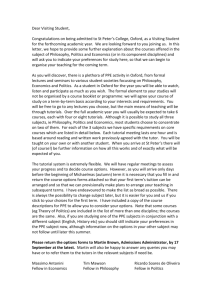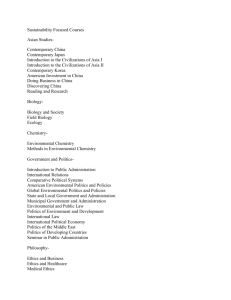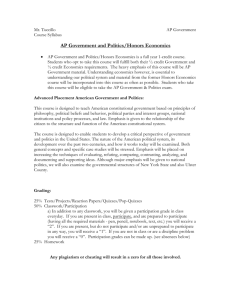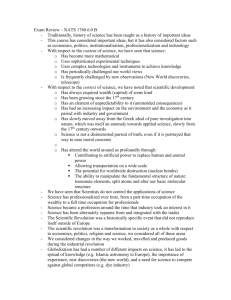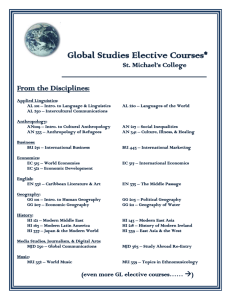Gateway Introduction to Politics, Philosophy
advertisement
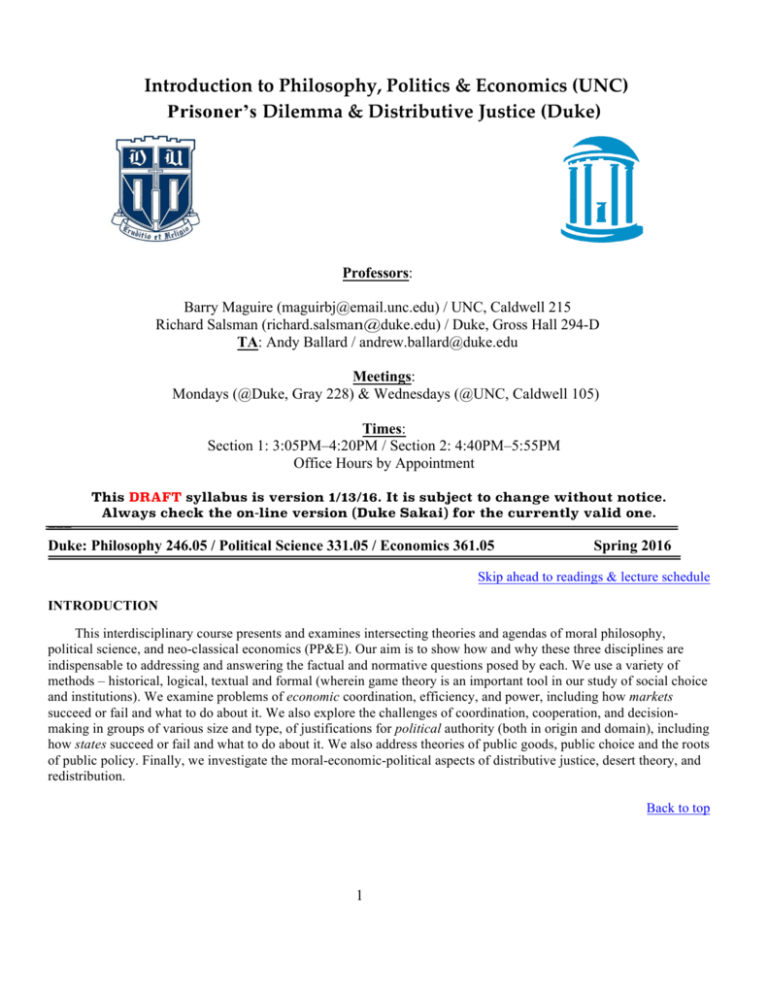
Introduction to Philosophy, Politics & Economics (UNC) Prisoner’s Dilemma & Distributive Justice (Duke) Professors: Barry Maguire (maguirbj@email.unc.edu) / UNC, Caldwell 215 Richard Salsman (richard.salsman@duke.edu) / Duke, Gross Hall 294-D TA: Andy Ballard / andrew.ballard@duke.edu Meetings: Mondays (@Duke, Gray 228) & Wednesdays (@UNC, Caldwell 105) Times: Section 1: 3:05PM–4:20PM / Section 2: 4:40PM–5:55PM Office Hours by Appointment This DRAFT syllabus is version 1/13/16. It is subject to change without notice. Always check the on-line version (Duke Sakai) for the currently valid one. === Duke: Philosophy 246.05 / Political Science 331.05 / Economics 361.05 Spring 2016 Skip ahead to readings & lecture schedule INTRODUCTION This interdisciplinary course presents and examines intersecting theories and agendas of moral philosophy, political science, and neo-classical economics (PP&E). Our aim is to show how and why these three disciplines are indispensable to addressing and answering the factual and normative questions posed by each. We use a variety of methods – historical, logical, textual and formal (wherein game theory is an important tool in our study of social choice and institutions). We examine problems of economic coordination, efficiency, and power, including how markets succeed or fail and what to do about it. We also explore the challenges of coordination, cooperation, and decisionmaking in groups of various size and type, of justifications for political authority (both in origin and domain), including how states succeed or fail and what to do about it. We also address theories of public goods, public choice and the roots of public policy. Finally, we investigate the moral-economic-political aspects of distributive justice, desert theory, and redistribution. Back to top 1 ASSIGNMENTS & GRADE WEIGHTS • Paper (30% of final grade): You will write one paper, 10-12 typed pages long, double-spaced (or no more than 3,000 words long, whichever is shorter). Topic: distributive justice. Due on Wed., April 27th (end of class). Each student must present to the instructors an outline of proposed work (details to be provided in class) by Wed., February 24 (end of class). A paper not submitted on time is late and loses a letter grade for each calendar day that it is late. Early discussion with the instructor, on topics and approaches, is welcomed. • Midterm Exam (30% of final grade): Partly multiple choice and partly short-answer essay questions, March 9. • 3 Quizzes (30% of final grade): On rational choice (January 27), strategic choice (February 15), and analytical politics (March 30). Format: all multiple choice questions. • Class Participation (10% of final grade): Read the assignments in advance. Ask probing questions. Make thoughtful criticisms. Engage others intellectually. Here, silence is not golden. TEXTBOOKS & READINGS Two Books (access to which is required): Title: Philosophy, Politics, & Economics: An Anthology Authors/Editors: J. Anomaly, G. Brennan, M. Munger, and G. Sayre-McCord. Publisher: Oxford University Press, 2015 ISBN-13: 978-0190207311 Title: On Philosophy, Politics, and Economics Author: G. Gaus Publisher: Cengage Learning, 2008 ISBN-13: 978-0495008989 In addition, shorter readings are available on the web—in many cases by merely clicking on the links embedded in the on-line version of this syllabus which will bring your browser to a pdf or html version of the text, or by search www.jstor.org, or by checking class resources in Sakai. In the case of both the books and the reserve readings, the last name(s) of the author(s) constitute(s) a unique identifier. LINKS TO RESOURCES (Duke) • • • • • • • Duke PPE Program: http://sites.duke.edu/dukeppe/ Duke Citations Practices: http://library.duke.edu/research/citing/ Duke’s Community Standard: http://integrity.duke.edu/new.html Holes, First Rule of: Stop digging, and get some help: http://www.studentaffairs.duke.edu/caps Illness / Excused Absences: http://trinity.duke.edu/academic-requirements?p=policy-short-term-illness-notification Plagiarism Defined (and Avoided): https://plagiarism.duke.edu/ Help in writing better: http://uwp.duke.edu/writing-studio LINKS TO RESOURCES (UNC) • • • • • • UNC PPE Program: http://ppe.unc.edu/ Plagiarism: http://writingcenter.unc.edu/handouts/plagiarism/ Writing Center: http://writingcenter.unc.edu/ Absence: https://deanofstudents.unc.edu/faculty-staff/student-class-absence-notifications Student Affairs: https://studentaffairs.unc.edu/ Safe Zone, this is a: https://lgbtq.unc.edu/programs-services/safe-zone Back to top 2 Attendance: You will lose 5% of your grade if you miss more than one class without a formal explanation. If you arrive more than ten minutes late for class, or leave more than ten minutes early, without a formal explanation, that counts as missing the class. Electronics Policy: Phones and Laptops are not allowed in class without explicit permission. Email: Please be professional. Do not ask anything you can find out without asking. Keep your questions brief and accept our apologies in advance for terse replies. Please send a short follow-up email if you do not receive a reply within two business days. TOPICS & READINGS Note: subject to change, with notice by e-mail. 1. Rational Choice Jan. 13 (W), 20 (W), 25 (M), 27 (W) Professor Maguire Topics: • PPE and Effective Altruism • Expected Utility • Commitments • Heuristics and Biases Readings: • • • • For 13 Jan: Herzog, “One of) Effective Altruism’s Blind Spots; or: Why Moral theory Needs Institutional Theory” (2015) Srinivasan, “Stop the Robotic Apocalypse – Review of MacAskill’s Doing Good Better” (2015) Brennan, “PPE: An Institutional View” (Journal of Politics, Philosophy & Economics, 2010). For 20 Jan: Frank Jackson, “Decision-Theoretic Consequentialism and the Nearest and Dearest Objection” (jstor) For 25 Jan: Warren Quinn, “The Puzzle of the Self-Torturer” (jstor); (optional: Kavka, “The Toxin Puzzle” (in reader)) For 27 Jan: Kahneman, “Thinking Fast and Slow, elections” 2. Strategic Choice Feb. 1 (M), 3 (W), 8 (M), 10 (W), 15 (M) Professor Salsman Topics: • Choosing in Groups & Voting (Feb 1 & 3) • Game Theory I [Basics] (Feb 8) • Game Theory II [PD] (Feb 10) • Game Theory III [Non-PD Games] (Feb 15) • Game Theory IV [Applied] (Feb 15) 3 Readings: • For 1 Feb & 3 Feb: - Olson, M. (1965). The Logic of Collective Action (excerpt). In Anomaly et al, Philosophy, Politics, & Economics: An Anthology, pp. 236-240. - Gauthier, D. (1986). “Rationality: Maximization Constrained.” In Anomaly et al, Philosophy, Politics, & Economics: An Anthology, pp. 56-69. - Gaus. (2008). On Philosophy, Politics, and Economics, Chapters 1, 2 & 5. - Munger & Munger (2015). Choosing in Groups, Chapters 2, 3 & 4. • For 8 Feb: - Ross, D. (2014). “Game Theory.” Stanford Encyclopedia of Philosophy. - Gaus. (2008). On Philosophy, Politics, and Economics, Chapter 4. - Morris, C. and Verbeek, B. (2010). “Game Theory and Ethics.” Stanford Encyclopedia of Philosophy. - Blackburn, S. (1998). “Game Theory and Rational Choice.” In Anomaly et al, Philosophy, Politics, & Economics: An Anthology, pp. 78-88. - Bowles, S. and Gintis, H. (2004). “The Evolutionary Basis of Collective Action.” In Anomaly et al, Philosophy, Politics, & Economics: An Anthology, pp. 271-282. • For 10 Feb: - Kuhn, S. (2014). “Prisoner’s Dilemma.” Stanford Encyclopedia of Philosophy. - Axelrod, R. (1980). “Effective Choice in the Prisoner's Dilemma.” Journal of Conflict Resolution 24 (1), pp. 3-25. - Axelrod, R. (1981). “The Emergence of Cooperation Among Egoists.” American Political Science Review 75 (2), pp. 306-318 • For 15 Feb: - Hampton, J. (1987). “Free Rider Problems in the Production of Collective Goods.” In Anomaly et al, Philosophy, Politics, & Economics: An Anthology, pp. 241-255. - Brenann, J. & Tullock, G. (1982). “An Economic Theory of Military Tactics: Methodological Individualism at War.” In Anomaly et al, Philosophy, Politics, & Economics: An Anthology, pp. 116-128. - Schelling, T. (1978). “Dynamic Models of Segregation.” In Anomaly et al, Philosophy, Politics, & Economics: An Anthology, pp. 89-97. - Mackie, G. (1996). “Ending Foot-Binding & Infibulation: A Convention Account.” In Anomaly et al, Philosophy, Politics, & Economics: An Anthology, pp. 97-116. 3. Models & Methods Feb. 17 (W), 22 (M), 24 (W) Professor Maguire Topics: • Epistemology • Economic Models • Methodological Individualism Readings: • • • For 17 Feb: Margaret Little – “The Role of Affect in Moral Epistemology” For 22 Feb: Mary Morgan – “Economic Man as Model Man” For 24 Feb: Philip Pettit – “The Common Good” 4 4. Analytical Economics Feb. 29 (M), Mar. 2 (W), Mar. 7 (M) Professor Salsman Topics: • Spontaneous Order v. Deliberate Design (Feb. 29) • Nature of Property, Prices & Profits (Mar. 2) • Market Success & Failure (Mar. 7) • Capitalism, Socialism & Hybrid Systems (Mar. 7) Readings: • • • For 29 Feb: - Hamilton. A. (1787-1788). Federalist Paper #1 (Oct. 1787) and Federalist Paper #85 (Aug. 1788). - Barry, N. (1982). “The Tradition of Spontaneous Order” - Ullmann-Margalit, E. (1978). “Invisible Hand Explanations.” Synthese, pp. 263-291. - Norton, R. (2008). “Unintended Consequences” (Concise Encyclopedia of Economics) For 2 Mar: - Say, J.B. (1803). “Of the Right of Property” (Book I, Chapter XIV) and “Of the Basis of Value & of Supply & Demand” (Book II, Chapter I) in A Treatise on Political Economy. - Smith, A. (1776). “Of the Division of Labor” (from An Inquiry Into the Nature and Causes of the Wealth of Nations). In Anomaly et al, Philosophy, Politics, & Economics: An Anthology, pp. 164-172. - Locke, J. (1695). “Venditio” (Sakai reading) - Hayek, F.A. (1945). “The Use of Knowledge in Society.” In Anomaly et al, Philosophy, Politics, & Economics: An Anthology, pp. 172-177. - Munger, M. (2011) “Euvoluntary or Not, Exchange is Just.” Social Philosophy & Policy, pp.192-211 (Sakai reading) For 7 Mar: - “Perfect Competition.” Economics Online. - Richmond, S. (2013). “The Myth of Market Failure” - Carden, A. and Horwitz, S. (2013). “Is Market Failure a Sufficient Condition for Government Intervention?” - Rand, R. (1957). “The Story of the Twentieth Century Motor Company” - Salsman, R. (2011). “Capitalism Isn’t Corporatism or Cronyism” March 9 (W): Midterm Exam (in class). NOTE: If you know now that you cannot attend this midterm, let us know immediately. Only medical excuses will be accepted after January 27th. Spring BREAK: March 11-20—No classes March 14 & 16 5. Analytical Politics Mar. 21 (M), 23 (W), 28 (M), 30 (W) Professor Salsman Topics: • Median Voter Theorem & Spatial Analysis (Mar. 21) • Democracy: Pros & Cons (Mar. 23) • Public Choice & Domain of Government (Mar. 28) • Government Success & Failure (Mar. 30) Readings: • For 21 Mar: 5 - Thomas, D. (2103). “Why Do Politicians All Sound the Same? The Median Voter Theorem” (3 minute video). - Munger, M. (2015). “Politics as Spatial Competition,” Chapter 5 in Choosing in Groups (pp. 83-104). - Munger, M. (2015). “Two Dimensions: Elusive Equilibrium,” Chapter 6 in Choosing in Groups (pp. 105-134). • For 23 Mar: - Downs, A. (1957). “An Economic Theory of Political Action in a Democracy,” pp. 435-449. - Brennan, G. and Lomasky, L. (2000). “Is There a Duty to Vote?” In Anomaly et al, Philosophy, Politics, & Economics: An Anthology, pp. 470-487. - Brennan, J. (2009). “Polluting the Polls: When Citizens Should Not Vote.” In Anomaly et al, Philosophy, Politics, & Economics: An Anthology, pp. 487-491. - Huemer, M. (2015). “Why People are Irrational about Politics.” In Anomaly et al, Philosophy, Politics, & Economics: An Anthology, pp. 456-467. - Munger, M. (2015). “Every Flaw in Consumers is Worse in Voters.” - Munger, M. (2005). “Democracy is a Means, Not an End.” • For 28 Mar: - Buchanan, J. (2003). “Public Choice: Politics Without Romance.” In Anomaly et al, Philosophy, Politics, & Economics: An Anthology, pp. 431-435. - Munger, M. (2006). “Rent Seek and You Will Find.” In Anomaly et al, Philosophy, Politics, & Economics: An Anthology, pp. 449-452. - Buchanan, J. (1993). “How Can Constitutions be Designed so that Politicians Who Seek to Serve the Public Interest Can Survive and Prosper?” In Anomaly et al, Philosophy, Politics, & Economics: An Anthology, pp. 453-456. • For 30 Mar: - Keech, W. and Munger, M. (2015). “The Anatomy of Government Failure,” Public Choice (Sakai reading) 6. Distributive Justice Apr. 4 (M), 6 (W), 11 (M), 13 (W), 18 (M), 20 (W), 25 (M) Professors Maguire & Salsman Topics: • For 6 Apr: Hobbes on Authority (Maguire) • For 11 Apr: Libertarianism / Property, Rights & the State (Locke/Nozick/Schmidtz) (Salsman) • For 13 Apr: Hume on Property (Maguire) • For 18 Apr: Marx on Justice (Maguire) • For 20 Apr: Liberalism (Maguire) • For 25 Apr: Socialism (Maguire) • For 27 Apr: Price Gouging (Maguire / Salsman) Readings: • • • • • • • Hobbes in reader Locke, Nozick, Schmidtz in reader Hume in reader Marx, Critique of the Gotha Programme, Communist Manifesto (selections) Rawls in reader Cohen, Why Not Socialism (class resources) Price Gouging (in reader) April 27 (W): Course Summary & Due Date for Paper on Distributive Justice 6
